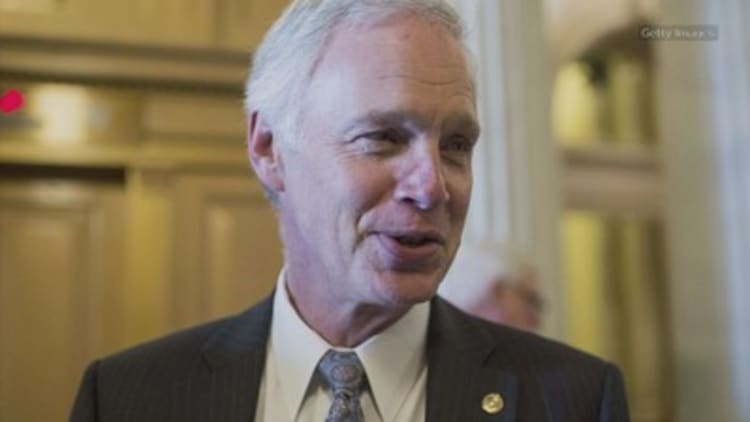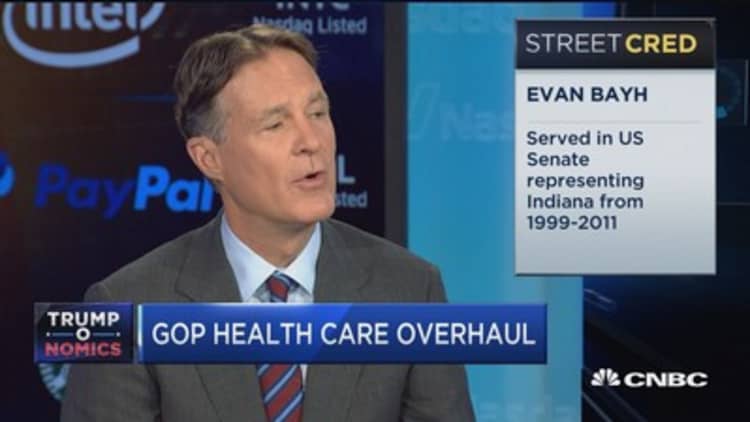
As his own reform plan struggles, the House tax committee chairman recently invited critics to offer better ideas. Sen. Ron Johnson took that as his cue.
"I sent him an email and said, 'Here it is,'" the Wisconsin Republican recalled in an interview. He was talking about one of the rare tax-reform proposals with genuine bipartisan potential.
The idea is simple: Slash taxes on corporations and raise them on the people who profit from those corporations. The goal is eliminating incentives for corporations to move abroad for lower tax rates without expanding the budget deficit or providing a windfall for the wealthy in an era of wide income inequality.
Johnson calls it "the viable Plan B" in case the House plan to enact the so-called border adjustment tax definitively stalls. He says Ways and Means Committee Chairman Kevin Brady was "intrigued" when he passed his idea on, but whether Brady and Speaker Paul Ryan might eventually adopt it remains unclear.

Johnson, a conservative former business executive, favors a far-reaching version of this approach. He would eliminate taxation of corporate entities altogether, recouping lost revenue by taxing dividends and capital gains at ordinary income rates.
Since American corporate entities are far more likely to relocate than American corporate executives are, Johnson sees this as an effective answer to the wave of "inversions" that have drawn condemnation from both parties. He also cites the virtue of ending "double taxation" of corporate profits — first when the company earns them, and again when shareholders receive them as dividends.
Johnson is still working out details of his plan, which involves such intricacies as assigning "shareholder days" to those owning corporate stock within a year for purposes of taxing capital gains. Then he will obtain an analysis from the Congressional Budget Office.
The second-term senator acknowledges its vulnerability to attack as a giveaway to big business at the expense of financially squeezed working-class voters. Yet if you look beyond Johnson's variation to the larger approach it represents, you can see the promise it holds for both sides of the political divide.
Consider the more moderate version of the idea proposed last year by experts from the liberal-leaning Tax Policy Center and conservative-leaning American Enterprise Institute. Eric Toder and Alan Viard proposed to retain a 15 percent corporate tax while increasing taxation of corporate owners to ordinary income rates.
That would cut the current top rate of 35 percent by more than half, while giving shareholders a credit for their portion of the corporate taxes that remain. To avoid penalizing stock trades, their plan would tax capital gains each year on a "mark-to-market" basis, not simply when shares are sold.
"Our preliminary estimates indicate that the fully-phased-in proposal is close to revenue-neutral," Toder and Viard wrote.
They calculate that the government would take in $11 billion less in 2025 than under current law if corporations don't change their behavior. But reduced incentive for corporations to hold profits overseas could offset that loss enough to put the government ahead by $51 billion.
Significantly for attracting Democrats, they estimate that this corporate tax-cut plan would actually reduce income inequality rather than increase it. They estimate that the top 1 percent of earners would see their after-tax incomes fall by 1.62 percent, or an average of $37,804; all other income groups would see their after-tax incomes rise modestly, by less than 1 percent.
With Johnson's proposal still gelling and the Senate bogged down on health care, the senator has not yet accumulated co-sponsors. But he has had some preliminary talks with colleagues in both parties and holds out hope that the tax-reform debate could eventually turn in his direction.
"There's still a lot of work to be done," Johnson said. But he added, "it just solves so many problems."


